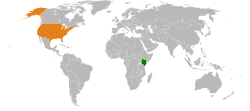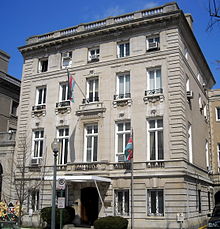Kenya–United States relations: Difference between revisions
→References: +Commons category |
No edit summary |
||
| Line 7: | Line 7: | ||
More than 9,000 U.S. [[citizen]]s are registered with the U.S. Embassy as residents of Kenya. In 2006 a record 86,528 Americans visited Kenya, up 17.6% from 2005. About two-thirds of resident Americans are [[missionaries]] and their families. U.S. business investment is estimated to be more than $285 million, primarily in [[commerce]], light [[manufacturing]], and the [[tourism industry]]. |
More than 9,000 U.S. [[citizen]]s are registered with the U.S. Embassy as residents of Kenya. In 2006 a record 86,528 Americans visited Kenya, up 17.6% from 2005. About two-thirds of resident Americans are [[missionaries]] and their families. U.S. business investment is estimated to be more than $285 million, primarily in [[commerce]], light [[manufacturing]], and the [[tourism industry]]. |
||
[[Al Qaeda]] terrorists [[1998 United States embassy bombings|bombed the U.S. Embassy]] in Nairobi on August 7, 1998, killing more than 200 and wounding thousands. Since that event, the Kenyan and U.S. Governments have intensified cooperation to address all forms of insecurity in Kenya, including [[terrorism]]. The United States provides equipment and training to Kenyan security forces, both civilian and military. In its dialog with the Kenyan Government, the United States urges effective action against [[Wikt:corruption|corruption]] and insecurity as the two greatest impediments to Kenya achieving sustained, rapid economic growth. |
[[Al Qaeda]] terrorists [[1998 United States embassy bombings|bombed the U.S. Embassy]] in Nairobi on August 7, 1998, killing more than 200 and wounding thousands. Since that event, the Kenyan and U.S. Governments have intensified cooperation to address all forms of insecurity in Kenya, including [[terrorism]]. The United States provides equipment and training to Kenyan security forces, both civilian and military. In its dialog with the Kenyan Government, the United States urges effective action against [[Wikt:corruption|corruption]] and insecurity as the two greatest impediments to Kenya achieving sustained, rapid economic growth. <ref>{{cite web| title = United States Aid to Kenya: Regional Security and Counterterrorism before and after 9/11 | url=http://www.studentpulse.com/articles/393/united-states-aid-to-kenya-regional-security-and-counterterrorism-assistance-before-and-after-911-}}</ref> |
||
[[File:Embassy of Kenya, Washington, D.C. 002.jpg|thumb|Embassy of Kenya in [[Washington, D.C.]]]] |
[[File:Embassy of Kenya, Washington, D.C. 002.jpg|thumb|Embassy of Kenya in [[Washington, D.C.]]]] |
||
U.S. assistance to Kenya is substantial. It promotes broad-based economic development as the basis for continued progress in political, social, and related areas of national life. The U.S. assistance strategy is built around five broad objectives: Fighting disease and improving [[healthcare]]; fighting [[poverty]] and promoting private sector-led prosperity; advancing shared democratic values, [[human rights]], and [[good governance]]; cooperating to fight insecurity and terrorism; and collaborating to foster peace and stability in East Africa. The [[Peace Corps]], which has 150 volunteers in Kenya, is integral to the overall U.S. assistance strategy in Kenya. |
U.S. assistance to Kenya is substantial. It promotes broad-based economic development as the basis for continued progress in political, social, and related areas of national life. The U.S. assistance strategy is built around five broad objectives: Fighting disease and improving [[healthcare]]; fighting [[poverty]] and promoting private sector-led prosperity; advancing shared democratic values, [[human rights]], and [[good governance]]; cooperating to fight insecurity and terrorism; and collaborating to foster peace and stability in East Africa. The [[Peace Corps]], which has 150 volunteers in Kenya, is integral to the overall U.S. assistance strategy in Kenya. |
||
Revision as of 00:09, 1 June 2011
 | |
Kenya |
United States |
|---|---|
Kenya – United States relations are bilateral relations between Kenya and the United States. The United States and Kenya have enjoyed cordial relations since Kenya's independence. Relations became even closer after Kenya's democratic transition of 2002 and subsequent improvements in human rights.
After Kenya's independence on December 12, 1963, the United States immediately recognized the new nation and moved to establish diplomatic relations. The embassy in Nairobi was established December 12, 1963—Kenya’s independence day—with Laurence C. Vass as chargé d'affaires ad interim pending the appointment of an ambassador.
More than 9,000 U.S. citizens are registered with the U.S. Embassy as residents of Kenya. In 2006 a record 86,528 Americans visited Kenya, up 17.6% from 2005. About two-thirds of resident Americans are missionaries and their families. U.S. business investment is estimated to be more than $285 million, primarily in commerce, light manufacturing, and the tourism industry.
Al Qaeda terrorists bombed the U.S. Embassy in Nairobi on August 7, 1998, killing more than 200 and wounding thousands. Since that event, the Kenyan and U.S. Governments have intensified cooperation to address all forms of insecurity in Kenya, including terrorism. The United States provides equipment and training to Kenyan security forces, both civilian and military. In its dialog with the Kenyan Government, the United States urges effective action against corruption and insecurity as the two greatest impediments to Kenya achieving sustained, rapid economic growth. [1]

U.S. assistance to Kenya is substantial. It promotes broad-based economic development as the basis for continued progress in political, social, and related areas of national life. The U.S. assistance strategy is built around five broad objectives: Fighting disease and improving healthcare; fighting poverty and promoting private sector-led prosperity; advancing shared democratic values, human rights, and good governance; cooperating to fight insecurity and terrorism; and collaborating to foster peace and stability in East Africa. The Peace Corps, which has 150 volunteers in Kenya, is integral to the overall U.S. assistance strategy in Kenya.
Principal U.S. Officials include:
- Ambassador--Michael E. Ranneberger
- Deputy Chief of Mission—Pamela Slutz
- USAID Mission Director—Erna Kerst
- Public Affairs Officer—T.J. Dowling
The U.S. Embassy in Kenya is located on UN Avenue, Nairobi, P.O. Box 606, Village Market, Nairobi (tel. 254-20-363-6000; fax 254-20-363-6157).
See also
References
![]() This article incorporates public domain material from U.S. Bilateral Relations Fact Sheets. United States Department of State.[1]
This article incorporates public domain material from U.S. Bilateral Relations Fact Sheets. United States Department of State.[1]
External links
![]() Media related to Kenya – United States relations at Wikimedia Commons
Media related to Kenya – United States relations at Wikimedia Commons

